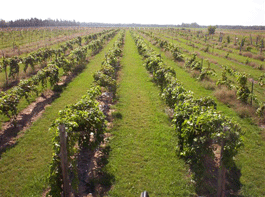
RUSSIA HINTS AT LIMITED RETURN OF GEORGIAN AND MOLDOVAN WINES TO ITS MARKET
Publication: Eurasia Daily Monitor Volume: 4 Issue: 129
By:

Georgian Wine Producers’ Union head Levan Koberidze has announced the start of preliminary consultations with Russia on the expert level about a possible reopening of the Russian market for Georgian wines. The Georgian producers’ organization seeks to broaden the consultations by reaching out to all Russian government and regulatory agencies, on which access to the Russian wine market depends (Interfax, June 2; Nezavisimaya gazeta, June 3).
Russia imposed a total ban the import of traditionally popular Georgian and Moldovan wines in March 2006, as a politically punitive measure against the two countries. Authorized by the Kremlin, the ban is being enforced by Russia’s Consumer Inspectorate, a government agency (RosPotrebNadzor). The pretext is in both cases that the wine quality was low and that adulterated wine consignments were found occasionally. However, the bans were imposed on all Georgian and Moldovan wine types and producers, without attempting to single out suspect producers or consignments for inspection. Moreover, most adulteration activity occurred on Russian territory, in bottling plants (some of them legal, some illegal) operating with “wine raw materials” imported from Georgia and Moldova.
The ban substituted the Russian state’s decision for Russian consumers’ decisions on wine quality. It is also a fact that the Russian wine market is a low-standard one and that Georgia and Moldova were trying to export their best wines on Western markets — a tendency that gained added impetus as a result of the Russian ban. Georgian wines have made some inroads into Western markets since the imposition of the Russian embargo and are taking effective steps to expand those inroads.
Moscow recently made an overture to Georgia regarding a possible revision of the wine embargo. The unlikely messengers were Yevgeny Primakov, chairman of Russia’s Chamber of Commerce and Industry, and his long-time alter ego, Boris Pastukhov, now the Chamber’s deputy chairman. Primakov had treated Georgia with vindictive hostility as minister of foreign affairs and prime minister of Russia, seconded in that vein by Pastukhov as deputy foreign minister in charge of handling the territorial conflicts. Almost a decade later, the same duo returned to Tbilisi on June 14-16 for a meeting of the CIS countries’ Chambers of Commerce and, apparently, a political ice-melting mission to Georgia.
Meeting with Georgian wine-makers as well as government officials, Primakov and Pastukhov indicated that RosPotrebNadzor and the Russian government could gradually reopen the market selectively for Georgian wines. Predictably denying any political motives behind the embargo, they attributed it to adulteration and smuggling by “mafias” in both countries. They proposed negotiations toward a system of mutual guarantees whereby Georgia’s Chamber of Commerce would supervise the quality of Georgian wine exports to Russia while Russia’s Chamber would [in unspecified ways] urge Russian authorities to curb smuggling and adulteration in Russia. They recognized, “The entire logic of Russia-Georgia relations demonstrates that economic sanctions lead nowhere, they only change the Georgian people’s attitude toward us for the worse” (Interfax, Georgian Public Television Channel One, June 14-16).
The situation is more difficult for Moldova. The country held a full 50% share of Russia’s wine market (compared with Georgia’s estimated 10% share) prior to the March 2006 imposition of the embargo. Moreover, wines (including brandy) are Moldova’s leading export article, and approximately 80% of this export went to Russia. The wine industry is Moldova’s main processing industry and its forced idling has caused a 6% decline in Moldova’s overall industrial production since the Russian embargo. The wine industry is also the main customer for annual bank credits in Moldova; thus, insolvencies in the wine sector could threaten the banking sector. Finally, unlike their Georgian counterparts, Moldovan wine producers and government agencies have not been effective in gaining market niches in Western and Central Europe. Psychologically as well, Moldovan producers and officials are still riveted to the Russian market.
Russian President Vladimir Putin has apparently inserted the wine trade as an issue in the negotiations with Moldova on the Transnistria conflict. As seen from Chisinau, Putin hopes to press Moldova into concessions on the terms of settlement, in return for lifting the embargo on wine. Putin has repeatedly hinted to Moldovan President Vladimir Voronin during their bilateral negotiations that Russia might lift the embargo in return for Moldovan accommodation of Russia’s position on the resolution of the conflict. Chisinau and Moscow have at one time or another publicized such hints officially, as a rule in connection with Putin-Voronin meetings. However, the situation has yet to change.
RosPotrebNadzor chief Gennady Onishchenko confirmed on June 18 and again on June 25 that Moscow and Chisinau are discussing the terms of a possible resumption of the wine trade on a limited scale. According to Onishchenko’s statements and other reports, Russia’s state-owned liquors company SoyuzPlodImport is slated to become the sole authorized importer of Moldovan wines and brandy. Only five Moldovan wineries — out of more than 50 — would receive Russian import authorizations.
The five short-listed companies have been selected politically: Two of them are in Transnistria, while the other three are owned by Russian businessmen. Moldova’s flagship wine companies are not on this short list. Russian officials and wine dealers anticipate that Moldova’s market share in Russia would be a meager one under such circumstances (Interfax, June 25, 28, July 2; Nezavisimaya gazeta, June 27; Basapres, June 25-July 2).
Moldova has no choice but to wean itself off the Russian market and invite Western investors into its winemaking sector. Voronin’s June 28 announcement that Moldova expects more Russian investors in its winemaking industry (and other industries across the board — Moldpres, June 28) sounds desperate and self-defeating.




